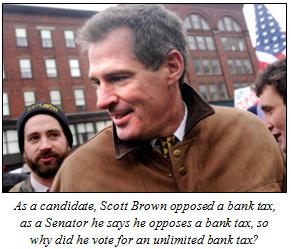Last week, the removal of a $19 billion bank tax from Senator Chris Dodd and Representative Barney Frank’s financial takeover conference legislation at the demand of Massachusetts Republican Senator Scott Brown received much fanfare in media outlets.
“US lawmakers scrap bank tax from finance bill,” reported AFP. “Brown’s threat gets bank tax removed,” declared the Boston Globe. “Bank Tax Is Dropped From Financial Overhaul Bill,” said the New York Times’ DealBook.
Only, there’s a small problem. There’s still another bank tax in the bill. A big one.
In fact, it’s unlimited. On pages 356 through 364 of the latest Dodd-Frank conference report, the Federal Deposit Insurance Corporation (FDIC) can still levy unlimited assessments on banks, insurance companies and other financial institutions with $50 billion or more in assets. Those will be directed to the so-called “orderly liquidation fund”, a ceaseless bailout-takeover fund for the FDIC use and replenish as it sees fit.
All without any vote in Congress to impose the taxes, which will be passed on to consumers of financial products, or to spend the funds to bail out, take over, or redistribute the assets of firms that come under the liquidation authority.
The “orderly liquidation fund” would also be financed by proceeds from securities issued by the FDIC of seized firms, interest and other earnings from investments owned by the fund, and “repayments to the Corporation by covered financial companies,” according to the legislation.
In a statement issued last week, Brown said, “I appreciate the conference committee revisiting the Wall Street reform bill and removing the $19 billion bank tax. Over the July recess, I will continue to review this important bill.”
It is unclear why Senator Brown would support the legislation’s unlimited bank tax when he opposed the $19 billion bank tax. A recent memo from the Conservative Action Project estimates that the bank tax could impose assessments on financial institutions totaling as much as $1 trillion.
Brown previously drew the ire of supporters in Massachusetts and nationwide for his prior support of the Senate version of the bill. Perhaps it was because that as a candidate he specifically ran against a bank tax on the premise that it would simply be passed on to the American people via higher financial transaction costs.
Brown said at the time as a candidate, “With all due respect, that money is going to be transferred down to the individuals through ATM fees, increased fees. I thought banks were supposed to lend. So now they’re going to take the money that they would be lending to the small businesses in this state and the men and women who want to buy homes … and there’s less of a pool there.”
More recently Brown told the Boston Globe, “I’ve said right from the beginning that I can’t support a bill that’s going to add a $19 billion bank tax. You think the banks are going to pay it? No. The individual consumers are going to pay this in the middle of a two-year recession, through higher ATM fees, credit card, bank fees.’’
Technically, he’s right. According to a Congressional Budget Office (CBO) analysis of a similar bank tax proposal by the Obama Administration, “the ultimate cost of a tax or fee is not necessarily borne by the entity that writes the check to the government. The cost of the proposed fee would ultimately be borne to varying degrees by an institution’s customers, employees, and investors, but the precise incidence among those groups is uncertain.”
Unfortunately, Brown has done nothing to remove the unlimited bank tax. It’s still in the bill.
“Senator Scott Brown may think he is playing savvy politics by negotiating the removal of the $19 billion bank tax, but he’s really nothing more than a bait fish to help the real bank tax get across the finish line. Brown is being played. He’s being used,” ALG President Bill Wilson declared.
But, by now, Brown should know that. While others will pretend there is no bank tax, with his stated concern on this issue, it is not unreasonable to hope that Brown will have done the due diligence to discover the stealth bank tax that makes any vote for the bill a broken campaign promise.
Robert Romano is the Senior Editor of Americans for Limited Government (ALG) News Bureau.


